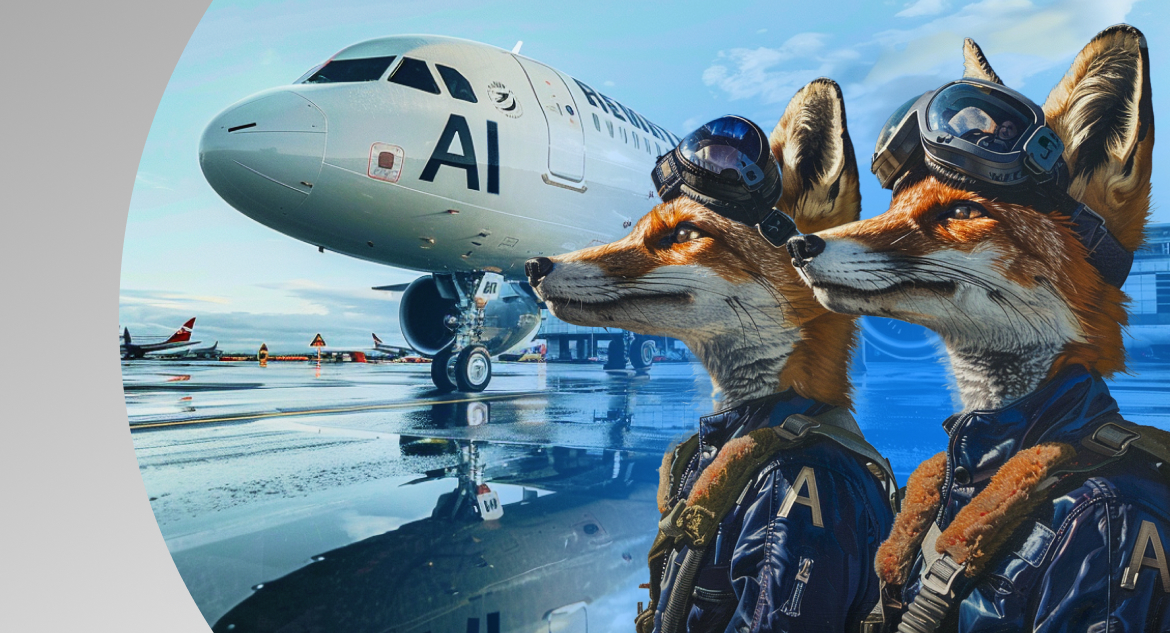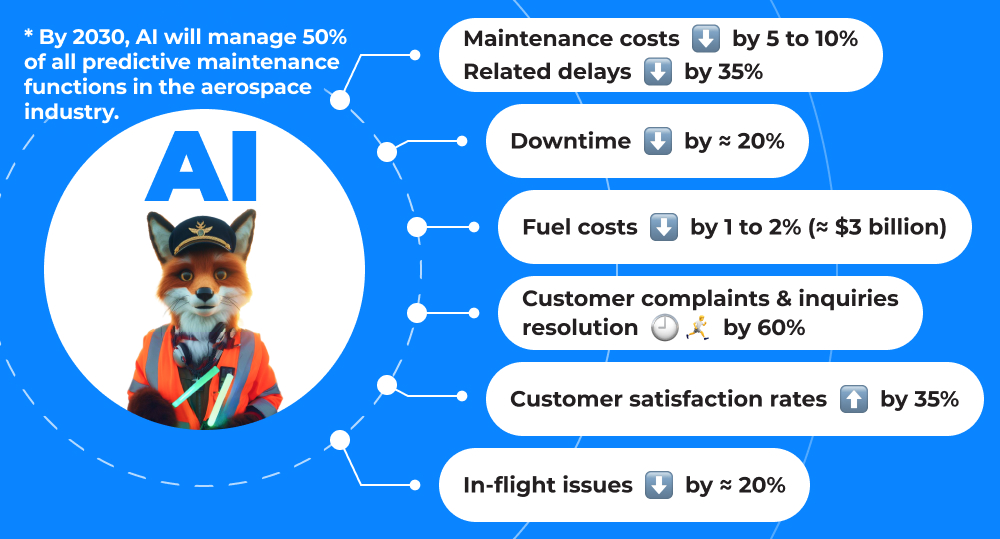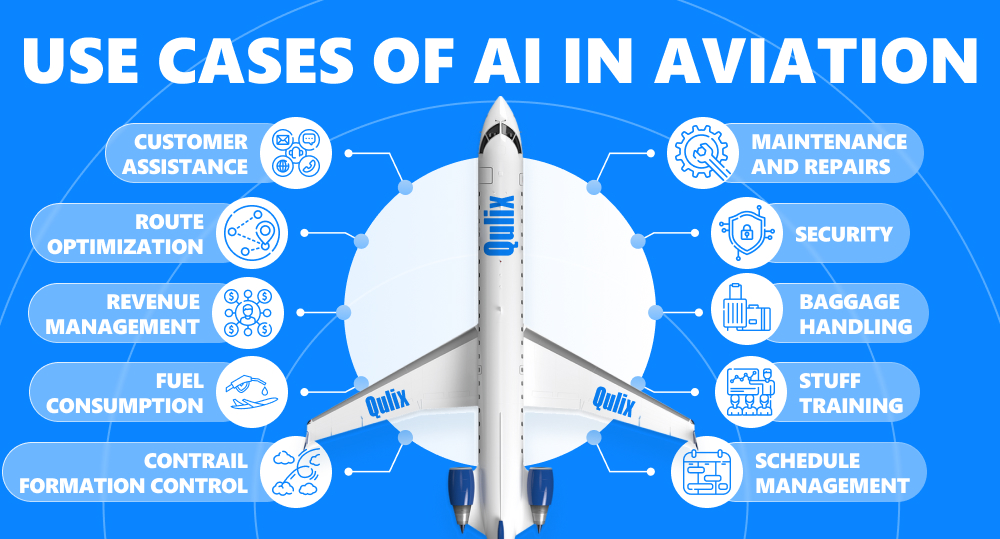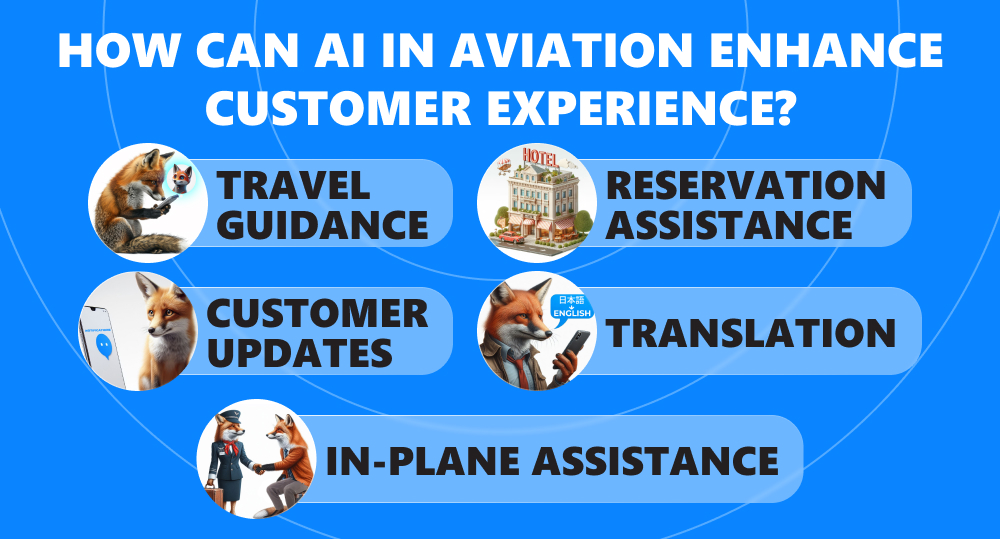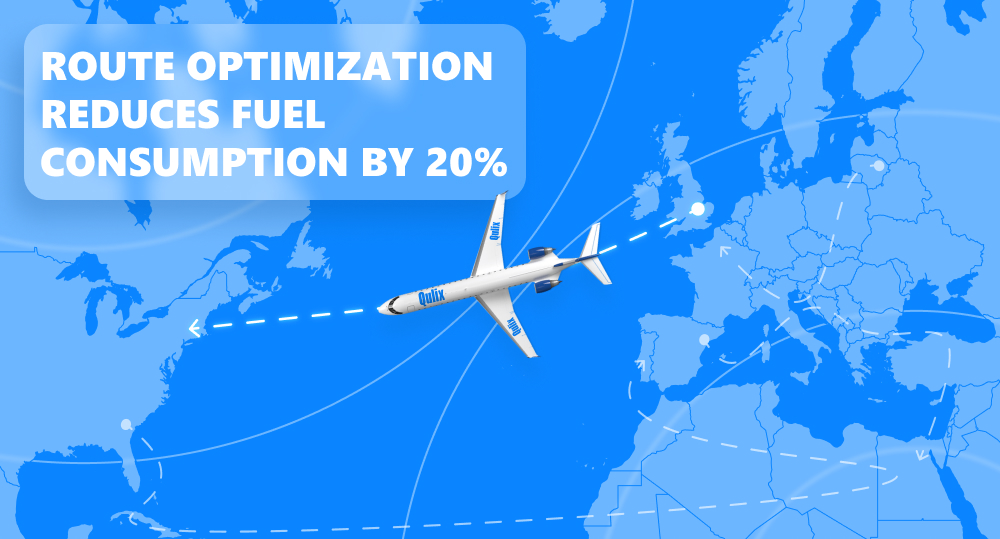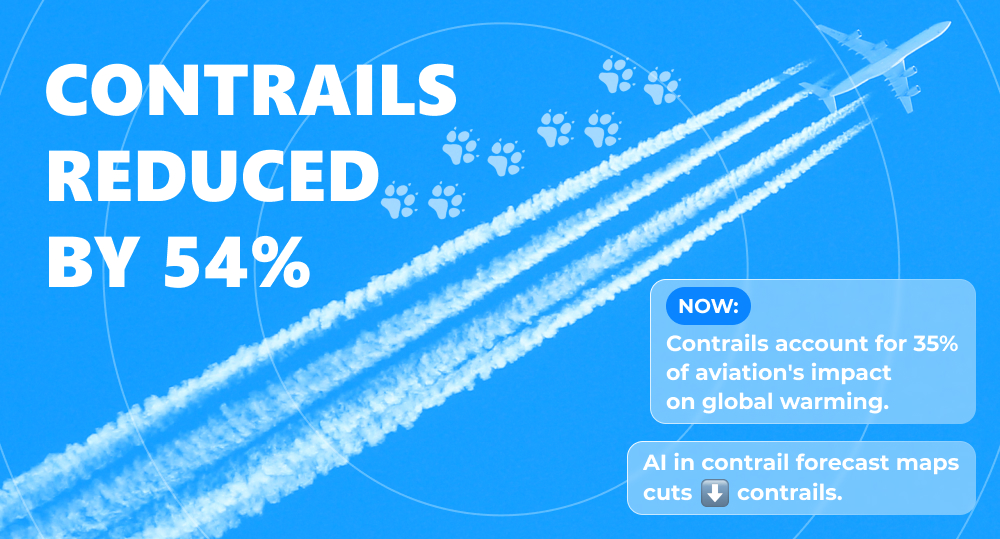AI in aviation? Yes, please! From use cases like maintenance and repairs, customer experience, and security to the titans of the industry like JetBlue, Lufthansa Group, and Boeing, artificial intelligence has been taking the field by storm. By 2032, the AI in aviation market size can rise to $31.01 billion from $3.41 billion in 2023 (Market Research Future). A ten-fold increase in less than a decade! Who could’ve guessed this would happen?
What is so special about this innovation that drives companies globally to join the AI aviation club? We invite you to reconnoitre use cases of prominent airlines and airports and find out how and why AI and aviation coexist.
written by:
Anton Rykov
Product Manager
Contents
Aviation AI: the Industry Overview
When people talk about artificial intelligence (AI) in aviation, they primarily mean gen AI. As SITA, the world's leading specialist in air transport communications and IT, puts it in their 2023 IT Insights report, “With the arrival of generative AI in 2023, the technology has surged to the top of airport and airline agendas, with 97% of airlines planning a program to develop the technology.” And while to ordinary folks the innovation’s union with air travel might seem surprising, aerospace actively benefits from AI. In airlines, and in airports, and in every major company's airplane, AI is already a pivotal part of the puzzle, despite the fact that it's been serving the field just for a couple of years.
What can technology notable for its embodiments like ChatGPT and Midjourney do for aviation? Many things, actually. Yes, generative AI is the type of artificial intelligence that generates content, but the notion of content doesn't narrow down to text, pictures, and videos. First and foremost, gen AI is about delivering information — and that can take any shape and form. Hence, even though ChatGPT comes to mind first, the artificial world of tangible breakthroughs is a lot richer than you might realize.
*Still, if you would like to learn more about how to integrate ChatGPT into the product that you’re offering, make sure to check out this article. And if you want to ensure that gen AI will deliver you just the content you need, click here for a guide on finding a common lingo.
To give you a hint on what gen AI can do for the aviation industry, we've gathered some statistics from Gitnux:
- The use of AI has the potential to cut maintenance costs by 5 to 10% and related delays by 35%.
- With AI's ability to predict potential failures, total downtime is reduced by 20% on average.
- Through route optimization, airlines are able to cut fuel costs by 1 to 2%, which equates to $3 billion.
- With AI, airline companies can expedite the time for customer complaints and inquiries resolution by 60%. Another thing that positively impacts customer experience in the field is automated check-ins by AI chatbots: they shorten waiting times and real-time responses, improving customer satisfaction rates by 35%.
- Additionally, with AI's predictive capabilities, flight attendants can foresee in-flight service needs. The ability to prepare for the demand minimizes in-flight issues by almost 20%.
- All in all, by 2030, AI is expected to manage 50% of all predictive maintenance functions in the aerospace industry.
It's time to check if your assumptions were true! We've compiled a list of use cases of AI in the aviation industry, as well as selected a few outstanding examples of airlines and airports that are acing it — or should we say AIcing? — as we speak. Ladies and gentlemen, welcome on board!
How Is AI Used in Aviation? Exploring Safety Use Cases
Maintenance and Repairs
Gen AI in aviation maintenance is the opportunity to make the most of predictive analytics. Combined, these tech advancements analyze flight data and data from sensors, build reports on historical maintenance records, and identify potential aircraft malfunctions.
Since airlines can take care of their machinery before a failure (often times, a fatal one), AI in airplanes leads to several significant benefits:
- optimized maintenance schedules;
- fewer flight disruptions;
- lower maintenance costs;
- extended service life of the machinery;
- strengthened security and safety of crew and passengers.
How do companies take advantage of artificial intelligence in the airline industry when it comes to predictive maintenance? Southwest Airlines, a U.S.-based company, finds it excellent for keeping order: they partnered up with AI startup AIXI to have it generate a database of discrepancies and offer fixes for Southwest's 800-aircraft fleet. After technicians scrutinize the issue, the system recognizes their entry as a valid summary of the problem.
Boeing, an aerospace industry leader, acts as another good representation of a proactive approach to safety matters: the air giant utilizes something called Airplane Health Management. The system monitors airplanes throughout a flight and foresees possible maintenance issues before they turn into a hazard. EasyJet, Europe's leading short-haul airline, adheres to a similar idea: it makes use of AI to anticipate component replacements, as well as to reduce delays and cancellations triggered by technical faults. Airbus, a European aerospace corporation, is tight with artificial intelligence, too: it relies on AI and deep learning to automatically detect defects in aircraft pipes.
Security
Gen AI chatbots can help travelers navigate the airport facility and send them real-time updates, instructions, and safety hazards alerts to ensure their safety (and peace of mind) in any scenario.
Also, things like X-Ray mapping, 3D image processing, and anomaly protection algorithms are pivotal when it comes to identification and verification of passengers. Their application curbs fraud, helps navigate emergency situations, and speeds up the more secured boarding process. For instance, the latter is already possible due to facial recognition currently in use in biometric terminals of Delta Air Lines (a U.S. air travel provider) at Atlanta and Minneapolis airports.
Baggage Handling
Nothing beats the anxiety people experience at the airport as they wait for their belongings to arrive. In the list of Top 10 most stressful moments at the airport, baggage collection occupies the first place, proudly stressing out 48.95% of respondents. Luckily, gen AI chatbots are here to soothe the nervous agitation.
Passengers can log the information about their possessions into the system and receive live updates on the location of their bags, which is something that Delta Air Lines, SITA, and Schiphol airport in Amsterdam already provide. In particular, travelers at Schiphol Airport can trace when exactly their bags will appear on the belt: you can monitor that via 150 screens in the baggage halls, or via the Schiphol app, or with the help of their website available through any browser. The system can confirm the whereabouts of your belongings across several locations: the plane, in-route to the baggage basement, and on the baggage belt.
Additionally, software of this kind enables you to report lost or damaged baggage. AI is here to guide travelers every step of the way: filling out the required forms, describing the items in question, and reaching out to appropriate airline staff to obtain further assistance. A great example of this is United Airlines, one of the biggest air travel companies in the U.S.: not only does gen AI assist with missing bags, it can also provide passengers with alternative travel options, like flying to a different city or driving, to get to the site of their destination.
What is more, self-drop baggage lanes enhanced with facial recognition have already been developed in hundreds of airports. They take the edge off human dependency and decrease baggage processing time.
What’s in Store for People Now That AI Is Taking Over Aviation?
Crew
Here, AI can take several routes:
- Training: AI has the capability to personalize experiences, i.e., it can adjust training simulators to the performance of each pilot, which creates a unique opportunity to elevate their skills. Also, recent studies found that AI in pilot training has reduced the overall training time by 35%. But it's not just pilots who can benefit from AI: UAE's premier airline company Emirates plans to use the innovation to train its cabin crew, too.
- Crew schedules: aircrew have vacations, mandatory rest times, they get sick, get transferred, etc. AI can analyze historical data to generate an optimized schedule based on all these factors, and then effortlessly adjust it to actual circumstances.
Customers
Enabling better customer experience is one of the most frequent reasons for companies to use gen AI. Considering how drastic of a change the technology brings about, it's not surprising that many companies across the globe invest into the development of customer facing tools.
Let's take a look at a few sections of CX where AI can win over the love of air travelers:
Travel guidance
An AI airline shouldn’t concentrate solely on the quality of a flight. AI can become a comprehensive and unique offer that makes the overall travel experience immaculate. From checking passport validity and visa regulations to recommendations on local customs, tourist attractions, and submitting feedback back to an airline, AI can turn into a tourist's most trusted companion.
Reservation assistance
Whether a customer needs to compare airfares, check flight schedules, book a ticket, or reserve other airport services, a gen AI-powered chatbot will nail the task. It can also propose personalized recommendations, which will become the cherry on top of the generally nerve-racking booking experience.
Customer updates
Chatbots have the ability not only to provide instructions on what to do in emergency situations and track baggage location, but also to answer FAQs about delays, gate changes, etc. This will take the pressure off the airport stuff and provide personalized assistance to customers without the need to endure additional waiting time.
Translation
AI in planes and airports will completely change the experience of travel if it offers passengers linguistic support. Due to AI's natural language processing capabilities, tourists would be able to receive assistance in their native language in any country and navigate their journey in a stress-free way.
In-plane assistance
With AI on a plane, flights would become a lot less of a drag. The technology can discover individual preferences for entertainment and diet. It can then pass its findings to flight attendants and help them take better care of those on board.
Let's see how AI is transforming customer experience in air travel right here and now:
- JetBlue, a U.S.-based airline, implemented a packaged generative AI-enabled solution. The solution is meant to boost automation and augmentation of the chat channel, which ultimately means assistance with JetBlue's contact center. The travel corporation found that this upgrade has saved them about 280 seconds per chat, which equates to 73,000 hours of agent time in the span of one quarter.
- Lufthansa Group's innovative platform Digital Hangar was built specifically to reshape the customer experience that the air giant crafts for its clients. Currently, they are using the initiative for content generation, text-related automation, and conversation servicing, but the plan is to launch a full-fledged concierge service to provide personalized recommendations for travelers. As a Lufthansa representative said, “I believe the customer will choose us due to their experience along the entire travel journey with us, and we have to do a lot more than we do today. Experience is not only the cherry on the cake.”
- Heathrow Airport in London is giving gen Ai a go together with their partner Capgemini. The solution offers e-commerce and other passenger services alongside four dedicated AI assistants to deliver a hyperpersonalized experience. The whole package includes a synthetic design assistant, personalized chatbots, a content and knowledge assistant for customer care, and a product and offers knowledge assistant.
- Munich Airport has improved customer service in the field of car renting through innovative artificial intelligence software. Installed in a scanning tunnel, it captures the condition of a vehicle in a matter of seconds. In a minute, that information becomes available to the vehicle check-in staff for the return process. The application of AI ensures absolute transparency of the assessment and reduces wait time. Ever since the software was installed, more than 60,000 vehicles have passed through the automated damage scanner.
- Air India, one of the largest airlines of the country, introduced an AI virtual agent called Maharaja. The air travel provider claims that it's the first virtual agent in the industry. The agent is powered by Microsoft Azure OpenAI Dervice, covers more than 1,300 domains, including topics like flight status, baggage allowances, packing restrictions, check-in procedures, frequent flyer awards, airport lounge access, flight changes, and refunds. For 6,000+ daily queries in Hindi, English, German, and French, Maharaja's accuracy rate is over 80%.
A Short Note on Flight Route Optimization and Revenue Management
Reasonable flight management is something that is unimaginable without AI. First, the issue of half-empty planes. With insufficient plain ticket sales and poorly planned flights, the airline’s expenses exceed income. Hence, we reveal the need to optimize flights and boost sales. Second, the overall quandary of fuel efficiency: if flying routes aren't properly thought-through, they are going to eat up more resources, which, again, cost money. Gen AI is the best way to solve the riddle: it puts together live and historical flight data, air traffic, weather patterns, etc., and constructs the most fuel- and time-efficient routes and schedules. The technology uncovers how to minimize flight delays, balance plane bookings (and rebook flights for customers if delays are inevitable), as well as finds ways to reduce fuel consumption by planes.
Skywise, an Airbus AI system, is an outstanding example of that: the application of in-flight data enables the program to improve the general smoothness of flight operations and reduce both maintenance issues and costs alike. EasyJet, Emirates, and Delta Air Lines are among those who take advantage of this wonderful innovation by Airbus.
Another piece of undeniable evidence that AI and profit are linked for life is Swiss International Air Lines: after the carrier decided to utilize the technology for the efficiency boost, they were able to optimize more than half their flights. That saved Swiss International Air Lines 5 million Swiss francs ($5.4 million USD).
JetBlue doesn't trail behind either: they have invested in 8 AI startups, including FLYR Lab, the developer of 'The Revenue Operating System'. This technology supports JetBlue in their pursuit to boost revenue with accurate, real-time decision intelligence and analytics. The program gathers vast amounts of data points, such as airline ticket and booking data, flight schedules and pricing of competitors, oil futures, and so on to uncover market drivers and suggest the most appealing pricing decisions.
Artificial intelligence in the Aviation Industry: Going Green?
Prediction and prevention of contrail formation
Even if you don't know what contrails are, you definitely saw them. Those are white, thin lines in the sky that trail airplanes sometimes. As it turns out, they have a huge climate impact. The 2022 IPCC report found that clouds created by contrails account for roughly 35% of aviation’s impact on global warming, and that is over half the impact of the world’s jet fuel.
We said that contrails appear only sometimes, as they heavily depend on the temperature and humidity levels. The same report by IPCC states that, “Contrails only form in ice-supersaturated air below a critical temperature threshold. It is therefore feasible to alter flight trajectories to avoid such areas conducive to contrail formation, since ice-supersaturated areas tend to be tens to hundreds of kilometers in the horizontal and only a few to 100 meters in the vertical extent. Theoretical approaches show that avoidance is possible on a flight-by-flight basis.” For doing anything on a case by case basis, you surely need technology.
To see what can be done, Google Research teamed up with American Airlines and Breakthrough Energy. They brought together data from multiple sources (satellite imagery, computer vision, weather and flight path data), applied AI, and generated contrail forecast maps. The pilots' job here was to test out the idea that with this map, you can select a flying route that would enable contrail avoidance. AI then was to measure the results and decide whether the avoidance attempt was successful.
Within 6 months, there were 70 test flights with the goal to avoid altitudes that are likely to create contrails. “After these test flights, we analyzed satellite imagery and found that the pilots were able to reduce contrails by 54%. This is the first proof point that commercial flights can verifiably avoid contrails and thereby reduce their climate impact,” says the source.
Fuel consumption
Climate change is real, and AI systems are a very effective way of mitigating the aftereffects of the humankind's wrongdoing. As Our World in Data states, aviation accounts for around 2.5% of global CO2 emissions (a.k.a., burning fuel). So it is up to tech companies and the airline industry to find a way for reducing fuel consumption at scale. Aerodynamics in particular can be of tremendous help: recent technological advancements allow to simulate the way airflow goes over the aircraft's surfaces. That leads to the optimization of wing shapes and other components, which minimizes drag and enhances fuel efficiency. This is the kind of party that Boeing has already joined: they utilize AI and ML to enhance aerodynamics, materials and engine performance, and make their contribution to a greener travel.
Still, aerodynamics isn't the only thing that can make a difference. LanzaJet, a U.S.-based fuels technology company, is decarbonizing the skies with their low-carbon Sustainable Aviation Fuel (SAF). This is a true game-changer for the industry: the sustainable fuel is compatible with existing aircraft and infrastructure, and it signifies a huge step towards a more eco-friendly travelling.
Another idea was suggested by Thales, a French aerospace giant. It has developed a PureFlyt flight management system which utilizes AI to optimize aircraft trajectories, consequently reducing both fuel consumption and noise pollution. Thales’ research in the climate field also led them to explore the issue of contrails and air traffic management.
Fly or… FlAI? The Future of AI in Aviation
AI in the airline industry will always be employee of the year, because it just keeps proving that the impossible is very much doable. Who knows what its next steps will be? Perhaps, in five years we'll get to see AI flying planes, and in ten we'll know what it feels like to sign a contract for Mars virtual assistant development with aliens who will decide to turn the red fella into the main tourist attraction of the Milky Way. One thing is certain: artificial intelligence in the aviation market will continue to flourish, because AI transforms air travel for the best. And if it happens that you decide to bring your AI contribution to the aviation table, you know where to look for a reliable partner.
Yes, we were talking about ourselves, because we have quite a few AI solutions to boast of. Contact us, and we'll discuss the development of your AI product. Even if your plans do not include conquering the aerospace industry, we will help you soar up high in a domain of your choice.
Valuable Insights
Artificial intelligence in the aerospace industry is used for a myriad of things, and the list constantly replenishes. You can apply aerospace AI algorithms for maintenance prediction, security matters, baggage handling, training staff, managing crew schedules, optimizing routes, and generating more revenue. Another valuable use case here is AI in aerospace engineering. It makes space for innovation, as it can analyze vast datasets and create lighter, more aerodynamic aircraft structures.
AI in the aerospace industry enriches customer experience and through that reshapes the concept of travel as a whole: it proves that air travel isn't simply about getting from A to B by air. This technology pushes the boundaries of what's possible as easily as it maintains the highest standards of safety and performance.
AI technology is revolutionizing aviation with advancements like AI plane systems, aircraft AI navigation, and AI airplane maintenance, which elevates safety and efficiency in air travel. These benefits are hard to resist, which is why such giants of the industry as Delta, JetBlue, easyJet, Emirates, Lufthansa, Thales, United Airlines, and Swiss International Air Lines utilize AI for aircraft management and general operations' improvement.
AI for airports is as common as AI for planes. The technology can enhance security and safety of airports with the help of X-Ray mapping, 3D image processing, and anomaly protection algorithms, as well as provide instructions in emergency situations to travelers via a chatbot. Also, AI solutions ease up the pressure on the airport staff as they can assist with baggage retrieval and associated complaints, provide personalized recommendations and guidance in an airport, offer help with reservations, and much more.

Contacts
Feel free to get in touch with us! Use this contact form for an ASAP response.
Call us at +44 151 528 8015
E-mail us at request@qulix.com

